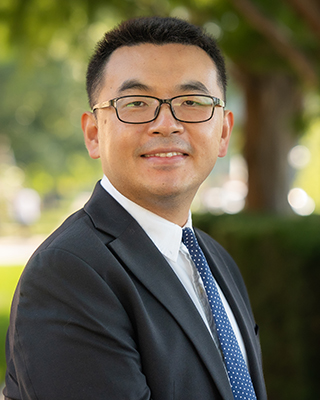Ren exploring how auditor-provided tax services impact auditor independence
Oct 6, 2025, 08:00 AM By
The Tax Cuts and Jobs Act (TCJA) of 2017 was the biggest tax overhaul since the Tax Reform Act of 1986, and it sent many large multinational companies scrambling for experts who could understand its impact. Several turned to their auditors for help, bringing two different services (audit and tax) together under one roof. It was a seismic shift in the financial landscape. And for Gies Business Teaching Assistant Professor Bo Ren, it was the perfect opportunity to explore a question that many had been pondering for years — how do auditor-provided tax services (APTS) impact auditor independence?
Previous research has yielded mixed results, says Ren. “On one hand, people are saying that APTS can benefit audit quality by creating a knowledge spillover effect, because auditors can talk to tax practitioners about that client and ask for information. But, on the other hand, regulators are concerned that those services might impair auditor independence and damage audit quality, because when they provide tax services the auditing firm derives significant fees, which might compromise their independence.”

One thing was certain, however; the new tax act was a boon for auditing firms who were happy to sell tax services to their clients. “My study found that, after TCJA, firms significantly acquired more auditor-provided tax services,” said Ren, noting an 11% increase in APTS. "But I also documented an unintended consequence, which is this knowledge spillover effect. Because the TCJA increased the tax complexity, companies asked their auditors to do more tax planning and compliance work, which helped auditors to get more understanding of their clients.” In the end, says Ren, that led to higher quality audits, proving that there is merit for one company providing both services.
Ren’s interest in research began shortly after he completed a masters of accounting at the University of New Mexico. For four years he remained in the state, working as an auditor while completing his CPA and CMA. But eventually he decided to wanted a job that would allow him to answer some of the questions that arose from that work. That led to a PhD in accounting at the University of Connecticut and a teaching position at the University of Akron, where he was nominated for an outstanding teacher award by his students. Now, he's joining the Department of Accountancy at Gies College of Business, whose reputation for research provided a powerful draw.
“Gies Business is renowned for its research, and faculty members conduct impactful research that’s published in top-tier journals,” said Ren, who looks forward to collaborating with faculty on a wide range of research topics, including auditing, tax regulation, and financial accounting.
“I’m also attracted to Gies because of the teaching excellence,” said Ren. “The undergraduate accounting program is ranked No. 1 in the nation by U.S. News. I want to learn what teaching methods they employ, so that I can use them in my classes to inspire students and make an impact.”
Ren, who will be teaching ACCY 303: Accounting Institutions and Regulation this fall and ACCY 405: Assurance and Attestation in the spring, says his teaching will focus not just on the basics but also on the tools students need to succeed outside the classroom. That means helping students build their interpersonal skills and explore the technology they’ll encounter in the field. Through collaborative assignments and case studies drawn from the present day, he hopes to make learning interesting for his students and create graduates who are ready to pursue business on purpose, starting on day one.
